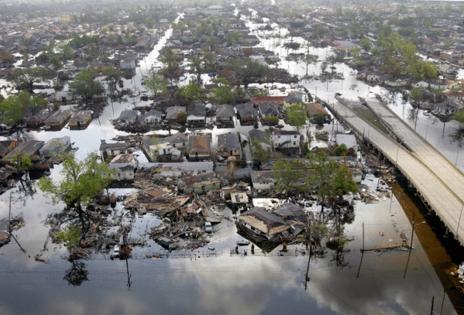Nedra Rhone: 20 years after Katrina, Atlanta is no longer the top haven for evacuees
Published in Op Eds
ATLANTA — “What happens when your whole life is upended?”
This, I believe, is a rhetorical question that Jovaughn Recasner has posed to me when we talked on the phone days before the 20th anniversary of Hurricane Katrina. Recasner, a New Orleans native, evacuated to Atlanta during the historic storm and has remained here ever since.
I’ve read news stories and watched documentaries marking the anniversary of Katrina, and I’ve learned there is no single answer to that question.
Atlanta has long been considered one of the most hospitable landing places for displaced people. But over the past 20 years, many Katrina evacuees have left the metro area. I called Recasner because I wanted to ask why he chose to stay.
We know the big story of what happened Aug. 29, 2005: how a Category 5 storm hurled toward the Gulf Coast and weakened to a Category 3 storm before making landfall near New Orleans.
We know the storm passed, but the water kept coming — rising at a rate of 2 feet per hour — until 80% of the city was flooded. The levees that had held for 40 years failed again, leaving at least 250,000 homes uninhabitable and underwater.
We have heard less about what happened to the 33% of New Orleans residents who were there during the storm but had not returned to the area a year later.
In 2006, almost 15% of them were living in metro Atlanta, but by 2019, that number had dropped to just under 8%, according to recent analysis by Elizabeth Fussell, a researcher at Brown University who has utilized government data to conduct longitudinal research on Katrina displacement.
About 31% of Katrina evacuees were still outside of New Orleans in 2019, but they mostly fled to Texas. Only 11.7% of them had landed in Houston in 2006 compared to 38% in 2019.
Recasner, 48, a second-generation firefighter, had been on leave with a broken wrist when Katrina swept through the city. As a teen, he had developed an affinity for Atlanta, having spent time here with relatives. So when he and his then-girlfriend evacuated, Atlanta seemed like a good place to relocate temporarily. They stayed for a month but had every intention of returning to New Orleans.
When they did, they were in shock.
“It is crazy when you see the breakdown of society,” Recasner said. “Folks didn’t have anything.”
A month and a half later, he was back in Atlanta.
Recasner got a job with the East Point Fire Department. He also got engaged. “Life-changing events change your perspective,” he said. His fiancee moved to Atlanta in June 2006, and they married that November.
Then came the economic downturn of 2008, and Recasner was laid off. He went back to school, studying at Atlanta Technical College and Georgia State University, where he earned a degree in economics.
In 2013, he received a fellowship in public health and relocated to Tacoma, Washington, for a year, leaving his wife and two young sons at home in South Fulton. When the fellowship ended, he settled into a job at the Centers for Disease Control and Prevention, where he still works today.
“The kids were born here. We established our lives here,” Recasner said. Atlanta “has been good to me.”
The couple figured that once their sons (now in eighth and 10th grades) had launched, they would return to New Orleans. But during frequent trips home, Recasner realized just how much New Orleans had changed.
His family is still there. His heart is still there. But he’s not sure that he should be there.
When you talk to people who lived through the storm, so many of their life events are categorized as pre- or post-Katrina.
Before Katrina, New Orleans was awash in the richness of its culture — the food, the eclectic music and the tight-knit communities that made people feel safe and seen.
Post-Katrina, those elements still exist, but some of those neighborhoods are different, and some of the people are different.
“Overall, it doesn’t look the same,” Recasner said. “Culture is created by those of us with the least … and the people with resources only see how they can make money off devastation.”
Having friends and family in Atlanta might have helped early evacuees feel a sense of community, but they also needed access to jobs and affordable housing, something that Atlanta had in short supply.
Houston and other cities in Texas have offered to many Katrina evacuees what Atlanta has only offered to some: a sustainable life and a two-way exchange of culture that left both the city and its people better.
Atlanta, of course, has its enclaves of New Orleans culture. Kevin Drawe, co-owner of Atkins Park Tavern, said the Smyrna location has always been a landing spot for people from the Crescent City, even before Katrina.
Drawe’s sister Shannon had evacuated and stayed in Atlanta before returning to New Orleans during the COVID-19 pandemic to care for their parents, he said.
“Everything is about a celebration in New Orleans,” Drawe said. “It is about food and fun, but it is also about family. When people were forced to leave New Orleans, our place was a place where family gathered.”
I still can’t answer Recasner’s initial question, but I learned that for some evacuees who stayed in Atlanta, the wounds of Katrina still run deep. People may move on with life, but sometimes just beneath the surface, a longing for home remains.
©2025 The Atlanta Journal-Constitution. Visit at ajc.com. Distributed by Tribune Content Agency, LLC.
























































Comments